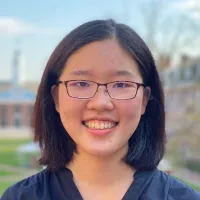
Photo by Noah Berger/UCSF
Alexandra Klein, postdoctoral scholar, walked home with first prize and $4,000 for her 3-minute pitch, titled “Take a Deep Breath: Understanding the Neural Basis of How Respiration Influences Emotions.”
Postdoc Slam 2024: Take a deep breath, it’s good for you
Emotions were high in Mission Bay Byers Hall at the annual UCSF Postdoc Slam 2024 last month, but one postdoc shook off the nerves by taking a deep breath.
Alexandra Klein, postdoctoral scholar in the Kheirbek Lab, walked home with first prize and $4,000 for her 3-minute pitch, titled “Take a Deep Breath: Understanding the Neural Basis of How Respiration Influences Emotions.”
Part of National Postdoc Appreciation Week, Postdoc Slam is a meaningful opportunity for postdocs to hone and showcase their communication and public speaking skills. The challenge: to present your research in a compelling, engaging manner in just under three minutes, using easy-to-understand language.
Ten finalists were selected based on video entries in a preliminary round, before they received individual coaching from the Office of Career and Professional Development (OCPD) to help them polish their talks for the final round.
Instead of jumping straight into speaking, Klein started her talk with a deep, deep breath.
“I already feel much calmer,” she said. “I was very nervous just a second ago.”
Taking a deep breath in other situations can also help you relax, “for example, when the airplane is taking off, when your experiment has failed, or when you’re mad at the Cybertruck driver who just cut you off,” she said.
It is well-known that breathing helps modulate your emotions, but the underlying mechanisms are still unknown.
“What happens in the brain of an anxious person taking a few deep breaths?” she asked.
To answer this, Klein turned to studying the brain of a simpler model organism, the mighty mouse.
“I can stimulate the region of the brain that drives breathing, the preBötzinger complex, to analyze if slowing down breathing can impact neural activity or behavior,” she stated.
And the results?
“My preliminary data show that neural activity and breathing indeed fluctuate at the exact same rhythm, and if I slow down a mouse’s breathing, I can indeed relieve it from its anxiety,” Klein said.
This could form a basis for breathing therapies as a non-invasive treatment for a variety of mental health disorders, she said.
Klein celebrated her win with colleagues and friends at Tartine, followed by cocktails at True Laurel, her favorite spot.
“I am still processing first place,” Klein said. “I really did not expect to win — it was the first time I win a first prize in a competition!”
Looking forward, Klein wishes to understand connections between the brain and the rest of the body, and how that impacts our emotions.
Sonia Nocera, PhD, from the Chan Lab, won both second place and People’s Choice Award, taking home $2,000 and $750. Her playful talk, “The Power of a Sugar Daddy,” explained how a type of sugar in breast milk could aid in slowing down myelin-related neurodegenerative diseases, winning the hearts of the audience.
In a joint third place win were Alicer K. Andrews, PhD, from the Roan lab, and Colin Hoy, PhD, from Little lab. Andrews studies how “elite controllers” – a small population of people with HIV who do not need treatment to contain the virus – are able to go drug-free for long and found that their T-cells have a special type of membrane protein that enables them to find the virus quicker.
Hoy’s research leverages brain implants to target specific circuits causing mood-related disorders such as bipolar disorder or depression. Together with patients who already have implants for physical movement, he found a precise signal he could manipulate to help maintain happy
Interested in participating in the next iteration of Grad Slam or Postdoc Slam yourself? Here’s what the winners had to say about preparing for the competition.
Getting feedback from your peers, as well as taking Postdoc Slam preparation courses hosted by the Office for Career and Professional Development (OCPD), is key.
“Sometimes it is hard to hear such direct feedback or criticism, but it just really helps to make your talk and your presentation skills better,” Klein said.
“Focus on the big picture of your research and don’t be afraid to take risks,” she said. “This is an amazing opportunity to be super creative with how you convey complicated topics, so don’t be shy about letting your personality shine through.”
Next, according to Hoy, Andrews and Nocera, is practice, practice, practice.
“I prepared by iterating a lot on the exact wording to make the ideas flow well, and the best measure was practicing with people that didn’t know my work or even the field,” Hoy said.
“What ideas were clear? Where did you get hung up? Did this joke land?”
“If you mess up during your practice, keep going,” Andrews added. “It’s important to be comfortable improvising on the spot.”
“I’m not someone who memorizes things word for word, so for me it helped to practice a lot in a way where I knew what I wanted to say, even if the words weren’t always exactly the same,” Nocera said.
Last, but not the least, have fun.
“If you’re enjoying yourself, the audience will feel that energy, and it will come back to you,” Nocera said.
This year’s Slam judges included Josh Kornbluth, a monologuist and filmmaker based in Berkeley, Teaster Baird, Jr., PhD, associate dean of the College of Science and Engineering at San Francisco State University (SFSU), and Robin Marks, MA a senior public information representative in the UCSF Office of Communications.



